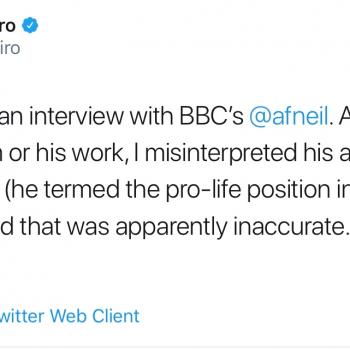Pavone, who spends a great deal of time congratulating himself, does not specify what specific actions he has in mind when says “what people like me did.” Can I assume that he includes among them his despicable, canonically illicit act of putting a dead fetus on a Catholic altar and filming a sensationalist campaign commercial for Donald Trump? Because abortion, abortion, abortion. Certainly Pavone thinks this something he did, for which we ought to be grateful, resulted in Trump’s election, and in consequence, his nominee for the Supreme Court.
Whatever he has in mind, what Pavone is saying here is that the ends justify the means. See, we have this wonderful SCOTUS nominee who is going to vote to overturn Roe. (That’s the claim, anyway.) If Hillary had won, we’d have very very bad nominees, and they’d ensure that Roe would be around even unto the hundredth generation. So if I had to do some shady things, it’s all for the good of the babies.
But no. This is called Consequentialism, and the Church condemns it. Here is the Catechism, §1753
A good intention (for example, that of helping one’s neighbor) does not make behavior that is intrinsically disordered, such as lying and calumny, good or just. The end does not justify the means.
And the desire to stop abortions does not justify violating canon 1239, which says that “An altar, whether fixed or movable, is to be reserved for divine worship alone, to the exclusion of any secular usage.”
Do you think that putting a dead baby on the altar and filming a campaign commercial for Trump is a “secular usage”? I do. I think it’s also a repugnant and sacriligeous use of a dead body.
Pope St. John Paul II also condemns consequentialism in Veritatis Splendor. Consequentialism, he says (§76), is “not faithful to the Church’s teaching.” That’s a nice way of saying it’s a heresy. It “cannot claim to be grounded in the Catholic moral tradition.” “A good intention,” he says later (78), “is not itself sufficient. A corect choice of actions is also needed.”
That’s a high standard, but it’s God’s standard and Catholics are called to it. Even if we fail sometimes, we are not to snub our noses at it or flout it from Twitter’s rooftops. And St. John Paul II would not be impressed with Fr. Pavone, or his insistence that “what people like me did” was all good because it got us Brett Kavanaugh.
Look, I hate abortion too. But pro-life Catholics can do better than to keep listening to this self-serving apologist for Caesar, for political advantage; but not for Christ or his commands. The sooner we are abhorred by what Fr. Pavone is willing to do and wash our hands of him and stop making him some pro-life folk hero, the better. As Dickens wrote, “Any good end can be achieved by good means. Those that cannot are evil and come from the father of evil.”

















